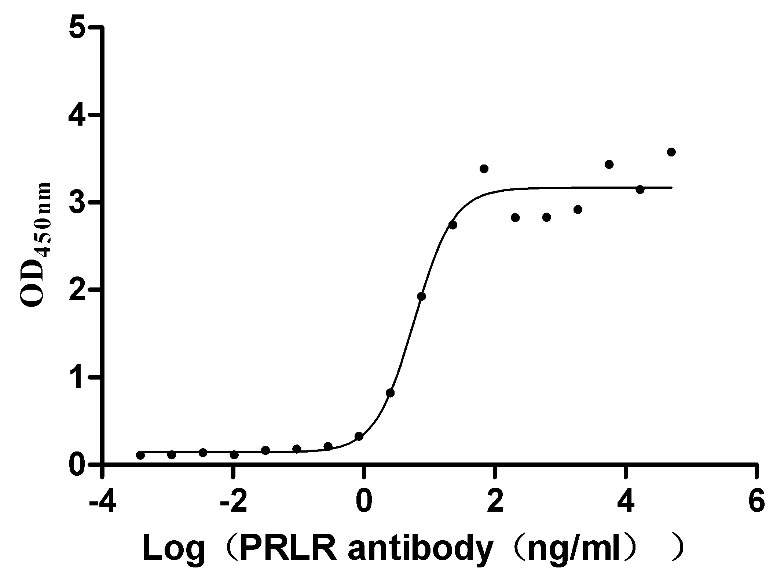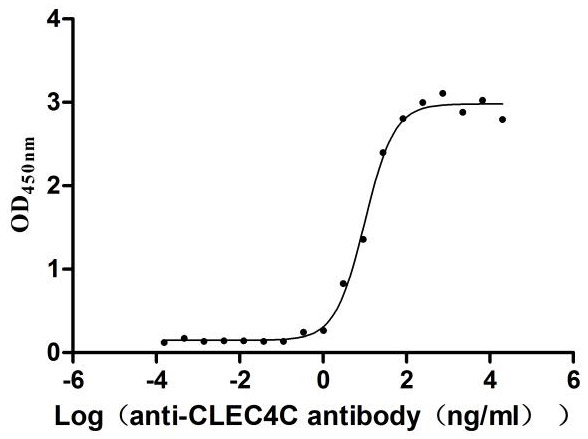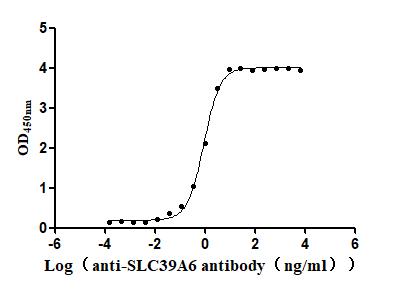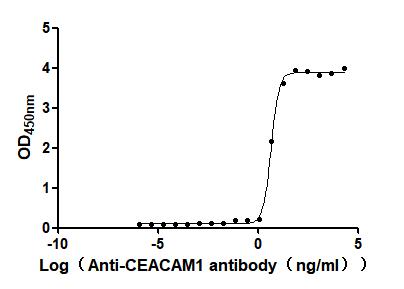Recombinant Human Protein DEK (DEK)
-
中文名称:Recombinant Human Protein DEK(DEK),Yeast
-
货号:CSB-YP006710HU
-
规格:
-
来源:Yeast
-
其他:
-
中文名称:Recombinant Human Protein DEK(DEK),Yeast
-
货号:CSB-EP006710HU
-
规格:
-
来源:E.coli
-
其他:
-
中文名称:Recombinant Human Protein DEK(DEK),Yeast
-
货号:CSB-EP006710HU-B
-
规格:
-
来源:E.coli
-
共轭:Avi-tag Biotinylated
E. coli biotin ligase (BirA) is highly specific in covalently attaching biotin to the 15 amino acid AviTag peptide. This recombinant protein was biotinylated in vivo by AviTag-BirA technology, which method is BriA catalyzes amide linkage between the biotin and the specific lysine of the AviTag.
-
其他:
-
中文名称:Recombinant Human Protein DEK(DEK),Yeast
-
货号:CSB-MP006710HU
-
规格:
-
来源:Mammalian cell
-
其他:
产品详情
-
纯度:>85% (SDS-PAGE)
-
基因名:DEK
-
Uniprot No.:
-
别名:D6S231E; Dek; DEK gene; DEK oncogene; DEK oncogene DNA binding; DEK_HUMAN; Protein DEK
-
种属:Homo sapiens (Human)
-
蛋白长度:Full Length of Mature Protein
-
表达区域:2-375
-
氨基酸序列SASAPAAEG EGTPTQPASE KEPEMPGPRE ESEEEEDEDD EEEEEEEKEK SLIVEGKREK KKVERLTMQV SSLQREPFTI AQGKGQKLCE IERIHFFLSK KKTDELRNLH KLLYNRPGTV SSLKKNVGQF SGFPFEKGSV QYKKKEEMLK KFRNAMLKSI CEVLDLERSG VNSELVKRIL NFLMHPKPSG KPLPKSKKTC SKGSKKERNS SGMARKAKRT KCPEILSDES SSDEDEKKNK EESSDDEDKE SEEEPPKKTA KREKPKQKAT SKSKKSVKSA NVKKADSSTT KKNQNSSKKE SESEDSSDDE PLIKKLKKPP TDEELKETIK KLLASANLEE VTMKQICKKV YENYPTYDLT ERKDFIKTTV KELIS
-
蛋白标签:Tag type will be determined during the manufacturing process.
The tag type will be determined during production process. If you have specified tag type, please tell us and we will develop the specified tag preferentially. -
产品提供形式:Lyophilized powder
Note: We will preferentially ship the format that we have in stock, however, if you have any special requirement for the format, please remark your requirement when placing the order, we will prepare according to your demand. -
复溶:We recommend that this vial be briefly centrifuged prior to opening to bring the contents to the bottom. Please reconstitute protein in deionized sterile water to a concentration of 0.1-1.0 mg/mL.We recommend to add 5-50% of glycerol (final concentration) and aliquot for long-term storage at -20℃/-80℃. Our default final concentration of glycerol is 50%. Customers could use it as reference.
-
储存条件:Store at -20°C/-80°C upon receipt, aliquoting is necessary for mutiple use. Avoid repeated freeze-thaw cycles.
-
保质期:The shelf life is related to many factors, storage state, buffer ingredients, storage temperature and the stability of the protein itself.
Generally, the shelf life of liquid form is 6 months at -20°C/-80°C. The shelf life of lyophilized form is 12 months at -20°C/-80°C. -
货期:Delivery time may differ from different purchasing way or location, please kindly consult your local distributors for specific delivery time.Note: All of our proteins are default shipped with normal blue ice packs, if you request to ship with dry ice, please communicate with us in advance and extra fees will be charged.
-
注意事项:Repeated freezing and thawing is not recommended. Store working aliquots at 4°C for up to one week.
-
Datasheet :Please contact us to get it.
相关产品
靶点详情
-
功能:Involved in chromatin organization.
-
基因功能参考文献:
- These findings define DEK as an important and multifunctional mediator of homologous recombination. PMID: 28317934
- DEK is detected in spontaneously forming neutrophil extracellular traps (NETs) from juvenile idiopathic arthritis patient synovial neutrophils, and DEK-targeted aptamers reduce NETs formation. PMID: 28165452
- High DEK proto-oncogene protein (DEK) expression associated with complete response to neoadjuvant chemoradiotherapy. PMID: 29409457
- High DEK expression is associated with cervical cancer tumorigenesis and metastasis. PMID: 28627610
- The results of the present study demonstrated that EMT of colorectal carcinoma cells was partially mediated by DEK, which likely affected the invasive ability of colorectal carcinoma cells. In addition, cell proliferation and apoptosis were susceptible to DEK silencing. PMID: 29115492
- RNA-sequencing proved to be a valuable tool for the detection of a fusion of genes DEK and NUP214 in a leukemia that showed cryptic cytogenetic rearrangement of chromosome band 9q34. PMID: 29109093
- DEK overexpression enhanced carcinogenesis, including field cancerization, in OSCC by stimulating the G1 /S phase transition and promoting DNA replication. PMID: 28834425
- DEK and LCMR1 were demonstrated to cooperate in the inhibition of apoptosis in lung cancer cells. PMID: 28765911
- High DEK expression is associated with breast cancer angiogenesis . PMID: 26988756
- our study indicates that DEK expression is required for tumorigenesis and metastasis of hepatocellular carcinoma PMID: 27057626
- High DEK expression is associated with melanoma progression. PMID: 27893188
- DEK correlates with IL6 expression in HPV16+/p16+ oropharyngeal squamous cell carcinomas (OPSCC). PMID: 28423581
- data support a scenario whereby overexpression of the human DEK oncogene reprograms keratinocyte metabolism to fulfill energy and macromolecule demands required to enable and sustain cancer cell growth PMID: 28558019
- Decreased DEK expression in plasma cells suggests a potential role of this gene in plasma cell development and lack of detectable DEK protein by IHC could be used as a biomarker for normal and malignant plasma cells PMID: 28558048
- Our data indicated DEK plays multiple roles to facilitate tumor growth and maintenance. It can be used as a potential target for astrocytic tumor diagnosis and gene therapy. PMID: 28670979
- High DEK expression is associated with pancreatic ductal adenocarcinoma. PMID: 27959420
- AP-2a is an important transcription factor of DEK expression, which is correlated with the methylation level of the DEK core promoter in hepatocellular carcinoma . PMID: 27499261
- miR-592 targets DEK transcript and suppresses hepatocellular carcinoma cell growth PMID: 26722432
- Results find that DEK binds to transcription start sites with a dual role in activation and repression of highly and ubiquitously expressed genes. PMID: 25216995
- The study identified the DEK oncoprotein as a critical factor that interacts with an essential upstream enhancer element of the EKLF promoter and exerts a positive effect on EKLF levels. PMID: 26303528
- DEK promotes the growth of colorectal cancer and apoptosis PMID: 25340858
- Data show that oncoprotein DEK facilitates cellular proliferation under conditions of DNA replication stress by promoting replication fork progression. PMID: 25347734
- The results show that several leukemia-associated fusion genes cause an increase in DEK protein expression. PMID: 25524609
- DEK expression during normal hematopoiesis did reveal a relationship with specific cell types implicating a distinct function during myeloid differentiation PMID: 25128083
- These data suggest DEK overexpression as a crucial event for the emergence of an aggressive phenotype in colorectal cancer. PMID: 25515240
- Studies demonstrate that DEK overexpression, due in part to Ron receptor activation, drives breast cancer progression through the induction of Wnt/beta-catenin signaling. PMID: 24954505
- DEK plays an important role in the progression of small cell lung cancer PMID: 25197373
- Results highlight a novel function of DEK as a guardian of chromatin by restricting widespread histone access, and in particular by modulating differential H3.3 loading in specific chromatin areas. PMID: 25049225
- t(6;9)/DEK-NUP214 represents a unique subtype of acute myeloid leukemia with a high risk of relapse. PMID: 24441146
- data demonstrate that DEK stimulates HNSCC cellular growth and identify DeltaNp63 as a novel DEK effector PMID: 24608431
- DEK is an hTERT repressor shared by various leukemia subtypes that may be involved in the deregulation of numerous genes associated with leukemogenesis PMID: 24563617
- High level of DEK protein expression predicts the poor prognosis of patients with gastric cancer PMID: 24650035
- the expression of the fusion gene DEK-NUP214 leads to increased cellular proliferation. We show that this is dependent on upregulation of the signal transduction protein mTOR with subsequent effects on protein synthesis and glucose metabolism. PMID: 24073922
- DEK plays an important role in the progression of colorectal cancers and it is an independent poor prognostic factor of colorectal cancers PMID: 23902796
- DEK depletion inhibited cellular migration in lung cancer cell lines possibly through inactivation of the RhoA/ROCK/MLC signal transduction pathway PMID: 23571382
- Full-length DEK secreted by one cell can be taken up by another cell, move to the nucleus, and function in heterochromatin biology and DNA repair, thereby potentially uniting the intracellular and extracellular activities of DEK. PMID: 23569252
- increased expression of DEK in chronic lymphocytic leukemia correlates with immunoglobulin heavy chain variable gene mutational status, CD38-positive and del(17p13), and DEK can therefore be considered as potential prognostic factor. PMID: 23052131
- DEK promotes the pathogenesis of estrogen receptor positive breast cancer. PMID: 23071688
- DEK may be involved in the pathogenesis of Merkel cell carcinoma and therefore may provide therapeutic implications for Merkel cell carcinomas. PMID: 22765016
- DEK has potent effects on HSCs, HPCs, and hematopoiesis, information of biological and potential clinical interest. PMID: 21943234
- C/EBPalpha and DEK coordinately activate myeloid gene expression. PMID: 22474248
- DEK knockdown results in a significant growth repression of CaSki cells by inducing cell apoptosis and senescence via upregulation of p65. PMID: 22390170
- DEK overexpression appears to be associated with breast cancer progression PMID: 22360505
- DEK is important for DNA double-strand break repair. PMID: 21653549
- DEK protein is expressed in bladder tumor tissue and voided urine of bladder cancer patients. PMID: 21663673
- DEK overexpression may be a frequent event in invasive melanomas, and further augmentation of DEK expression may be associated with the acquisition of ominous features such as deep dermal invasion and metastasis. PMID: 21316078
- data indicate that DEK expression stimulates the growth, stem cell character and motility of breast cancer cells, and that DEK-dependent cellular invasion occurs at least in part via beta-catenin activation PMID: 21317931
- identify the oncoprotein DEK, an abundant nuclear protein with a previously enigmatic in vivo function, as a Suppressor of Variegation [Su(var)] that is crucial to global heterochromatin integrity PMID: 21460035
- DEK can contribute directly to joint inflammation in juvenile idiopathic arthritis by generating ICs through high-affinity interaction between DEK and DEK autoantibodies. PMID: 21280010
- DEK overexpression, partly through an increase in its gene dose, mediates the activity of global transcriptional regulators and is associated with tumor initiation activity and poor prognosis in high grade neuroendocrine carcinoma of the lung. PMID: 20543864
显示更多
收起更多
-
相关疾病:A chromosomal aberration involving DEK is found in a subset of acute myeloid leukemia (AML); also known as acute non-lymphocytic leukemia (PubMed:1549122). Translocation t(6;9)(p23;q34) with NUP214/CAN (PubMed:1549122). It results in the formation of a DEK-NUP214 fusion gene (PubMed:1549122).
-
亚细胞定位:Nucleus. Note=Enriched in regions where chromatin is decondensed or sparse in the interphase nuclei.
-
组织特异性:Ubiquitous. Expressed at relatively high levels.
-
数据库链接:
HGNC: 2768
OMIM: 125264
KEGG: hsa:7913
STRING: 9606.ENSP00000380414
UniGene: Hs.484813
Most popular with customers
-
Recombinant Mouse Prolactin receptor (Prlr), partial (Active)
Express system: Mammalian cell
Species: Mus musculus (Mouse)
-
Recombinant Mouse Claudin-18 (Cldn18)-VLPs (Active)
Express system: Mammalian cell
Species: Mus musculus (Mouse)
-
Recombinant Human Interleukin-17A (IL17A) (T26A) (Active)
Express system: Baculovirus
Species: Homo sapiens (Human)
-
Recombinant Human C-type lectin domain family 4 member C (CLEC4C), partial (Active)
Express system: Mammalian cell
Species: Homo sapiens (Human)
-
Recombinant Macaca fascicularis Zinc transporter ZIP6 isoform X1(SLC39A6),partial (Active)
Express system: Baculovirus
Species: Macaca fascicularis (Crab-eating macaque) (Cynomolgus monkey)
-
Express system: Mammalian cell
Species: Homo sapiens (Human)



-AC1.jpg)
-AC1.jpg)













